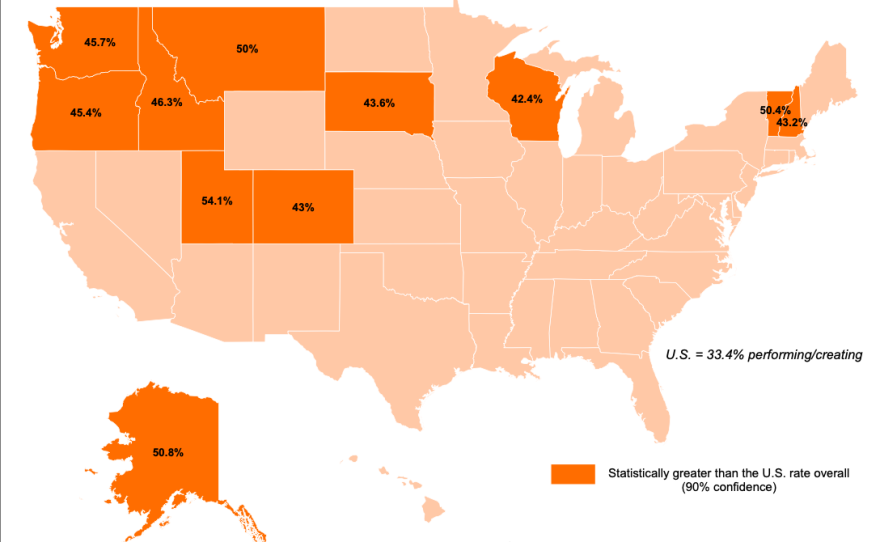According to the National Endowment for the Arts, Utah is the number one state for art participation and number two for attending live performances. But with the tax modernization reform bill repealed, officials say Utah’s general fund budget — where art funding comes from — is stretched thin. So why should funds go toward the arts and humanities?
Crystal Young-Otterstrom, with the Utah Cultural Alliance, said there are tangible benefits to increasing access to culture in the state — including benefits for education, which Republican House Representative Dan Johnson of Logan said is a top priority for the 2020 legislative session.
"We do have impacts on social health, mental health, physical health, on children's academic performance," Young-Otterstrom said. "They're more likely to be civically engaged, or more likely to graduate and more likely to have higher grades when they participate in arts and humanities education, and so it greatly, greatly benefits all Utahns. It's quality of life, but it is also life."
And beyond that, she said art pieces tell the story of humanity, of our successes and failures, struggles, and emotions — they are our history.
“You know, indigenous Utahns have been telling their story through dance, through rock art, since millennium. We have the largest collection of rock art in the world," Young-Otterstrom said. "Our pioneers, Utah settlers here, built a theater and a dance hall before they built any other public structure because they knew that dance and theater would bring that sense of community that they needed as new settlers in this territory. And it's an intrinsic part of who we are as Utahns, but it's an intrinsic part in all cultures and all societies.”
Appropriating state funds to help with preserving history is one of the Utah Department of Heritage and Arts’s biggest priorities for the upcoming year, according to its spokesperson Josh Loftin. Loftin said the department is the “heart and soul of Utah.”
“Whether it's arts, museums, historical organizations, cultural organizations, Native American tribes, libraries, that kind of stuff — these are all the things that just improved quality of life in a community," Loftin said. "They make people want to stay in their community, they make it attractive to visitors to come visit their community.”
According to Loftin, increasing funding to cultural and arts programs has an economic benefit for the state, as well.
“Those are the kind of things in, for small towns in particular, it can have a huge impact on their economy to have a few thousand people show up for a weekend," Loftin said. "And then, for the larger organizations you know, the Utah symphonies, and the Sundances, or the Shakespeare Festivals of the world, you know, those are huge economic drivers for the state.”
Loftin said last year, lawmakers approved $2 million in ongoing funding for arts, museum, and cultural grants. This year, they’ve requested $3 million more — which was also Governor Gary Herbert’s recommendation.
Pamela Gee is the director of the Opera by Children program with the Utah Festival Opera and works with the Professional Outreach Program in Schools (or POPS). For example:
“We do an original opera with the students they create a story, they create the 'libretto,' which is actually the words to the opera,” Gee said. "And then they create melodies. They create the scenery, the costumes, they perform it. And of course, to great acclaim."
POPS is managed by the Utah Board of Education and is sponsored by the Utah State Legislature. Last year, POPS received roughly $5 million in funding from the state. But that was matched by $7 million from donors.
“And what that says is that Utah, as a whole — foundations and private and individual donors — value the arts just as much as the legislature and they match those dollars," Gee said. "So we're making an impact and doing what is needed in the state to help reinforce the good work that the educators are doing in every school.”
Republican House Representative Dan Johnson of Logan said appropriating additional funding is needed to help provide cultural experiences to every student in Utah, and that’s why funding organizations like POPS and the Beverly Taylor Sorenson Arts Learning programs are so important — especially for rural parts of the state.
“Because in a lot of the, you know, more distant places, these kids don't have access to these kind of things,” he said.
But even with all of the art and culture experiences the Wasatch front has to offer, that doesn’t ensure equal access for everyone.
“If you are from a low income family, if you receive a free ticket to go to see an opera, that doesn't mean you have a parent who has money to pay for gas, or bus ticket, or whatever it takes to get you there," Gee said. "So it's not fair and we're not all getting to see the wonderful things that are around us. And so, they're missing some of the parts that are that make Utah so great.”
According to Gee, POPS served 544,263 students and 28,692 teachers last year, and her goal is to grow that number.
“A lot of educators are worried about bringing the arts into their schools, because of test scores or whatever it might be. I want them to stop worrying and just embrace what we are finding was intrinsically in our hearts and minds about it," she said, "and now there is so much research coming to bear about the impact that the arts have in our brain capacity, our abilities to communicate, everything is now being verified through data. I want to see people embrace the arts fully, not just because of the research or the data, but more because of the intrinsic, ‘We know it works, because it does.’”



